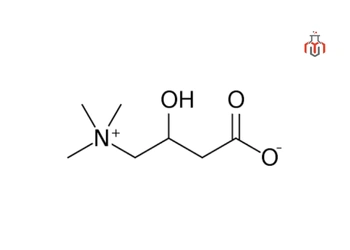
L-carnitine, also known as levocarnitine, is a naturally occurring amino acid derivative that plays a vital role in fat metabolism and energy production. It is biosynthesized in the human body from the amino acids L-lysine and L-methionine. L-carnitine is essential for transporting long-chain fatty acids into the mitochondria. It is primarily found in red meat and dairy products, and is widely used in dietary supplements.

CAS No.: 36687-82-8
Synonyms: Carnitine, Bicarnesine
| Physical Properties | |
| Chemical formula | C7H15NO3 |
| IUPAC name | 3-hydroxy-4-(trimethylazaniumyl)butanoate |
| Molecular weight | 161.20 g/mol |
| Solubility | Soluble in water, ethanol, and methanol Insoluble in ether, benzene, chloroform, and ethyl acetate |
| Odor | Odorless |
| Density | 0.64 g/cm3 |
| Stability | Hygroscopic |
| Chemical Properties | |
| Color | White |
| State | Crystalline Powder |
| Boiling point | 287.5 °C |
| Melting point | 197-212 °C |
| LogP | -5.48 at 20℃ |
| pH | 6.5-8.5 |
| Pictograms : |
|
| Hazard Statements : | H315 Causes skin irritation H319 Causes serious eye irritation H335 May cause respiratory irritation |
| Precautionary statements : | P261 Avoid breathing dust P264 Wash skin thoroughly after handling P271 Use only outdoors or in a well-ventilated area P280 Wear protective gloves/ eye protection/ face protection P302 + P352 IF ON SKIN: Wash with plenty of water P305 + P351 + P338 IF IN EYES: Rinse cautiously with water for several minutes Remove contact lenses, if present and easy to do. Continue rinsing |
L-carnitine, also known as levocarnitine, is a naturally occurring amino acid derivative that plays a vital role in fat metabolism and energy production. It is biosynthesized in the human body from the amino acids L-lysine and L-methionine. L-carnitine is essential for transporting long-chain fatty acids into the mitochondria. It is primarily found in red meat and dairy products, and is widely used in dietary supplements.

CAS No.: 36687-82-8
Synonyms: Carnitine, Bicarnesine
| Physical Properties | |
| Chemical formula | C7H15NO3 |
| IUPAC name | 3-hydroxy-4-(trimethylazaniumyl)butanoate |
| Molecular weight | 161.20 g/mol |
| Solubility | Soluble in water, ethanol, and methanol Insoluble in ether, benzene, chloroform, and ethyl acetate |
| Odor | Odorless |
| Density | 0.64 g/cm3 |
| Stability | Hygroscopic |
| Chemical Properties | |
| Color | White |
| State | Crystalline Powder |
| Boiling point | 287.5 °C |
| Melting point | 197-212 °C |
| LogP | -5.48 at 20℃ |
| pH | 6.5-8.5 |
| Pictograms : |
|
| Hazard Statements : | H315 Causes skin irritation H319 Causes serious eye irritation H335 May cause respiratory irritation |
| Precautionary statements : | P261 Avoid breathing dust P264 Wash skin thoroughly after handling P271 Use only outdoors or in a well-ventilated area P280 Wear protective gloves/ eye protection/ face protection P302 + P352 IF ON SKIN: Wash with plenty of water P305 + P351 + P338 IF IN EYES: Rinse cautiously with water for several minutes Remove contact lenses, if present and easy to do. Continue rinsing |
L-carnitine is a naturally occurring compound that plays an important role in fat metabolism and supports heart and muscle function. While Acetyl L-carnitine (ALCAR) is used for neurological health and cognitive function.
L-carnitine does not contain caffeine. It is an amino acid derivative combined with caffeine for supplement formulations to improve energy levels and fat metabolism.
L-Carnitine typically starts showing its effects within 2 to 4 weeks, while significant results may take 3 to 6 months. However, its effectiveness also depends on dosage, individual metabolism, and lifestyle factors.
L-Carnitine is not a standardized treatment for ADHD. However, Acetyl-L-Carnitine (ALCAR) has shown potential benefits in some studies for managing symptoms of attention-deficit/hyperactivity disorder (ADHD), including inattention and emotional dysregulation. More research is needed, and it should only be used under medical supervision.
For most healthy individuals, L-Carnitine is considered safe when taken at recommended dosages. However, in people with chronic kidney disease (CKD), L-Carnitine supplementation may require caution or medical supervision.
L-carnitine acetyl form (ALCAR) is a precursor for the neurotransmitter acetylcholine, which helps in mental alertness and focus. It has also been shown to increase levels of other neurotransmitters like noradrenaline and serotonin.